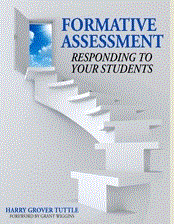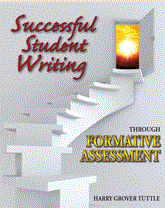Improve Speaking Fluency With Formative Assessment
Harry Grover Tuttle, Ed. D
Importance of Speaking:
Reasons for increasing the amount of student speaking in the classroom:
Formative Assessment (Tuttle, 2011): The process of helping students to immediately move forward from their present diagnosed learning to the expected learning.
Formative Assessment process:
Student response → Monitor → Diagnose → Give feedback → Time to incorporate feedback →
Re-assess → Celebrate success
Formative assessment create a culture of success, of constant improvement
Base speaking on ACTFL Proficiency Guidelines
Focus on language functions, not topics, such as socialize, ask questions, persuade, …
Use peer assessment to maximize assessment
Provide speaking assessment for fluency: Identify the specific language function and level.
Frequent short assessments that provide immediate feedback
Do a peer assessment in groups of two
Supply multiple strategies for speaking improvement for a language function
Narrate – Identify three strategies for describing what is happening in a visual
1
2
3
Have different speaking formative assessments:
1 Narrate a visual
2 Ask and answer questions – Walk
3 Tell preferences – 3×5 cards
4 Tell a story – Image
5 Give info -Ws
6 Mystery/Gap – Visuals
7 Provide rich details – Fluency +Variety
Resources:
Tuttle, H. G. (2012). Improving Foreign Language Speaking Through Formative Assessment
Larchmont, NY: Eye on Education. Description of book: http://wp.me/p262R-z0. Website:
Tuttle, H. G. (2009). Formative Assessment: Responding to Students. Larchmont, NY: Eye on Education. Website:
Teachers Pay Teachers. (Website of Teacher Created Resources -with some speaking activities I ‘ve made) http://www.teacherspayteachers.com/ Search for Harry Tuttle

